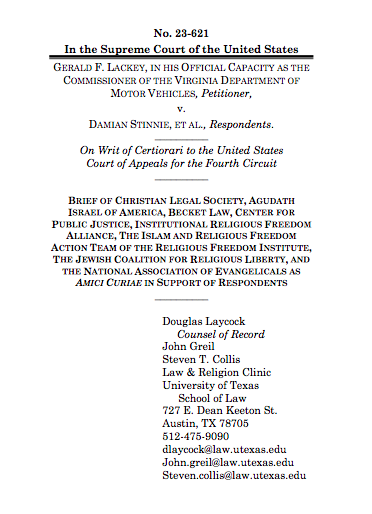Summary of facts: A group of Virginia residents filed a constitutional challenge in federal court alleging that their constitutional rights were violated by a state statute requiring the automatic suspension of the drivers’ licenses of those who failed to pay court fines. The district court granted a preliminary injunction, prompting the Virginia legislature to repeal the statute. The plaintiffs then petitioned for attorney’s fees under a statute requiring those who lose in court to pay the fees of the “prevailing party.” The district court rejected that request based on then-existing appellate court precedent holding that winning a preliminary injunction is not enough to render a plaintiff a “prevailing party” under the statute. The plaintiffs appealed, and the court of appeals overturned its precedent and reversed the district court’s ruling. The State of Virginia then appealed to the Supreme Court, asking it to hold that winning a preliminary injunction does not render a plaintiff a “prevailing party” such that a state must pay the plaintiff’s legal fees.
RFI’s position: Countless individuals seeking to vindicate their civil rights have done so by way of a preliminary injunction, with defendants responding by submitting to that injunction and mooting the case by changing their unlawful behavior. These cases can take years to litigate and thousands of attorneys’ hours. Adopting the State of Virginia’s proposed rule would make it economically foolish for plaintiff’s counsel to take on one of these cases. That would nullify Congress’s judgment that private actions should be available to enforce civil rights statutes. Religious individuals and organizations will be particularly harmed by Virginia’s rule.
Read the amicus brief here.
THE RFI BLOG

Is Egypt’s Government Trying To Take Over Christianity’s Most Important Monastery?

Does Southeast Asia Lead the World in Human Flourishing?

RFI Leads Training Session on Religious Freedom Law and Policy for U.S. Army War College

Oral Argument in Charter School Case Highlights Unconstitutional Motives Behind OK Attorney General’s Establishment Clause Claim

Largest Longitudinal Study of Human Flourishing Ever Shows Religion’s Importance
CORNERSTONE FORUM

Reaffirming Religious Freedom: Bridging U.S. Advocacy and Iraq’s Constitutional Framework

Political Polarization, Same-Sex Marriage and Religious Liberty

Bridging the Gap Between International Efforts and Local Realities: Advancing Religious Freedom in the MENA Region

Challenges to Religious Freedom in Iraq and the Critical Need for Action


